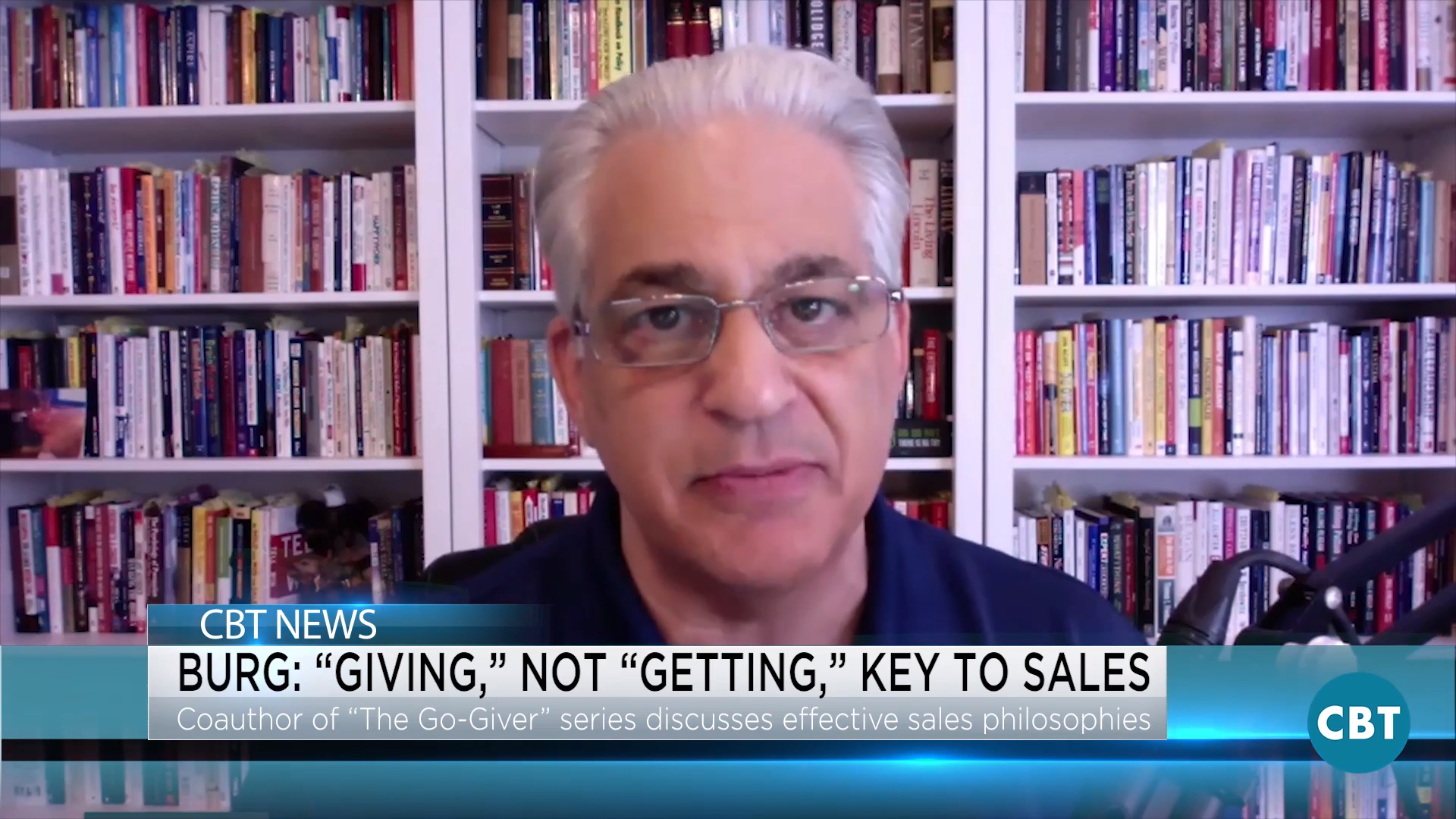Joining CBT Automotive News today is Bob Burg, top-producing salesperson, a talented public speaker, and a coauthor of the best selling Go-Giver Books. Bob Burg mentions during his interview with our network that a major problem in the world today is that people and businesses don’t know how to agree to disagree. Bob travels around the country to speak at country leadership and sales conferences to help people realize key points to get the results you want by making others feel good about themselves, the situation, and you.
VIDEO TRANSCRIPT:
Too often good ideas, products, and ordeals never reach their full potential due to the inability of the parties involved to agree. To discuss this common occurrence is Bob Burg, a top producing salesperson and a co-author of the bestselling Go-Giver books, which address the advantages of being more generous in your professional environment, and how sometimes you need to give in order to get.
Thank you for joining us today, Bob.
Hey, it’s great to be with you. Thank you for having me.
Sure.
So one thing that your books focus on is the idea that businesses have to put more of a focus on giving rather than getting. What is the most effective ways for businesses to do this?
Sure. Well, first, it’s just simple economics and good business. The basic premise is that shifting your focus from getting to giving … And when we say “giving” in this context, we simply mean constantly and consistently providing value to others, and understanding that doing so is not only a more pleasant way of doing business, it’s the most financially profitable way as well.
After all, nobody’s going to buy from you because you have a quota to meet. They’re not going to buy from you because you need the money, or even because you’re a really nice person who believes in your product or service. No. They’re going to buy from you only because they believe they’ll be better off by doing so than by not doing so, and that’s the only reason why they should buy.
What’s great about this is it means that the entrepreneur or the sales professional who is willing to move from an “I” or “Me” focus to an “Other” focus, looking for ways to just dazzle with great customer experience, this is the person who is going to make the most money, and this is why we also say that money is simply an echo of value.
An echo of value. I love it. That makes sense.
Some of your speaking involves shifting a team’s focus to selling value rather than competing for price. Why do you think this is so important for businesses and their teams?
Well, you know, technology has really leveled off the playing field. Most products and services are pretty much the same, and so in this day of commoditization, if a prospective customer can’t see a significant difference between two or more competitors, they’re always going to naturally go with who has the lowest price. And unless your last name is Walmart, trying to make low price your unique selling proposition is not a profitable, it’s not a productive, it’s not a fulfilling way of doing business.
So when you sell on price, you’re a commodity. When you sell on value, you’re a resource. And we want you to be a trusted resource.
Right. And it’s so much easier to do, isn’t it, for companies and sales people to focus on the value that they’re going to bring rather than to focus on price, right?
Yeah, and it really goes into understanding what selling really is at its most basic, because some people think that selling is about trying to convince someone to buy something they don’t want or need. That’s not selling. That’s called being a thief or a con artist. Selling is simply discovering what the other person wants, needs, or desires, and helping them to get it.
So when you do that, and that’s your focus, and when you can come at it not just from the … And, first of all, that’s very important, because it’s what that person’s looking for, and what they’re looking to accomplish. Intrinsically, your product or service needs to be able to fulfill that, giving them more in value or use value than what they’re paying, while you also make a very significant profit.
But, again, going outside just the intrinsic value, what’s going to really separate you from your competition, and take price out of the equation is when you’re able to add external value, and that’s all about the experience itself. How do you do that? You become that additional value.
How do you communicate it? Well, there are probably hundreds of ways, but they tend to come down to five what we call elements of value, and they are excellence, consistency, attention, empathy, and appreciation. And to the degree that you can communicate one or more, hopefully all five of those elements of value, at every single touchpoint from when you first meet that person, as you’re building the relationship, during the presentation, the referral process, and on, that’s the degree that you are that person they desire to do business with and refer to others.
And really it should be at the core of why you got into business in the first place. Whether it be to sell real estate, or sell cars, or sell insurance, all of these factors that you just mentioned should really be at the core of it anyway, right?
Exactly.
As the dollar should be just the reward of doing this correctly.
Yeah. You’re so right. It’s right on the mark. And you see that 99% of the time. Not always, but 99% of the time, those who earn a lot of money, they’re focused on that mission itself. Not the money. The money follows it, but they’re focused on pleasing the customer. They’re focused on bringing something of value to the marketplace that people need or want, and that’s really what it’s all about. You’re right. The money follows the value.
Yeah, for sure.
You said there’s one motivating factor shared by every single person on earth. Tell me about that.
Yeah. I learned this from a mentor of mine, Harry Brown, in his awesome books, The Secret of Selling Anything. And, by the way, the big secret is find out what people want and help them get it. But it was a beautiful book written in the 1960s, but published after he passed away, and it’s just an amazing book in understanding human nature, and bringing sales to human nature. It’s just a beautiful book.
And what he said was that in all ways, individuals are individuals, but there’s one common element. Ultimately, everyone seeks happiness. Now, there’s two things that go along with that. Two points. The first point is that happiness is relative. We all understand happiness differently, thus we place different values on different things. In other words, what makes one person happy would make someone else miserable, or be totally meaningless. And, again, in sales, one of the biggest mistakes salespeople make is assuming that because we like something about a feature or a benefit that that’s what a customer is going to like as well, and we don’t know that because they understand happiness differently than we do.
And then the third part … So, everyone seeks happiness; happiness is relative. Third is resources are limited. Now, that should not be confused with lack mentality. We live in an abundant universe. No, it’s that as human beings, we all have a limited amount of certain things. We have a limited amount of time, money, energy, knowledge, and so forth. And so we must constantly make choices. Throughout the day, as human beings, we make choices. Mostly unconscious, some consciously. Most unconsciously. We constantly make choices based on what we believe will bring us the best chance of happiness, based on how we understand happiness, and on the limited choices we believe we have.
When we understand this, now we never have to be disappointed by anyone else’s action because we know it was motivated ultimately by happiness, and that helps us to frame our presentation and the value we provide by simply finding out what will make them happy, and bringing that to them through our product or service.
Sure. And there might be some downturns or down times on your pursuit to happiness, but as long as you know what the end goal is, that being happy, then you can sustain those a little bit better, right?
Absolutely. And that’s just the difference between it being conscious and unconscious, and most people really … When they’re making a decision, they’re not saying, okay, well this is most likely to make me happy based on how I … Right? It’s just how it is. But when we understand it … First, we can understand it in our own decisions that we make as consumers, but we can also understand it within the selling process. Our job is basically, okay, to make other people happy. And we do this best through the immense value we provide through our products and services, and the overall experience that we give.
Yeah, and the experience is everything nowadays, isn’t it? Because people can just pick up one of these and buy a product and have it delivered right to their home, and sometimes they bypass the store, or the experience at either the showroom or the company itself.
Yeah. And the more technology continues to be a part of our life, and it will continue certainly, actually the more relationships matter.
Bob Burg, who is the co-author of The Go-Giver Books. If you haven’t gotten The Go-Giver Book or any of them, pick them up right away because you’re going to get a lot out of it as I do. I’ve got it right on the corner of my desk, and I refer to it all the time.
Bob Burg, co-author. I should say author, speaker, incredible salesperson. Thank you so much for your time today. We very much appreciate it, and hopefully we can have you back soon to talk more about these.








